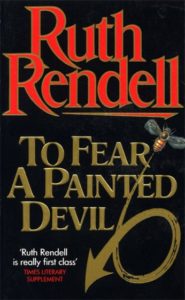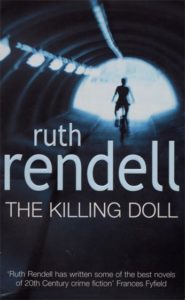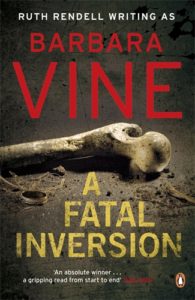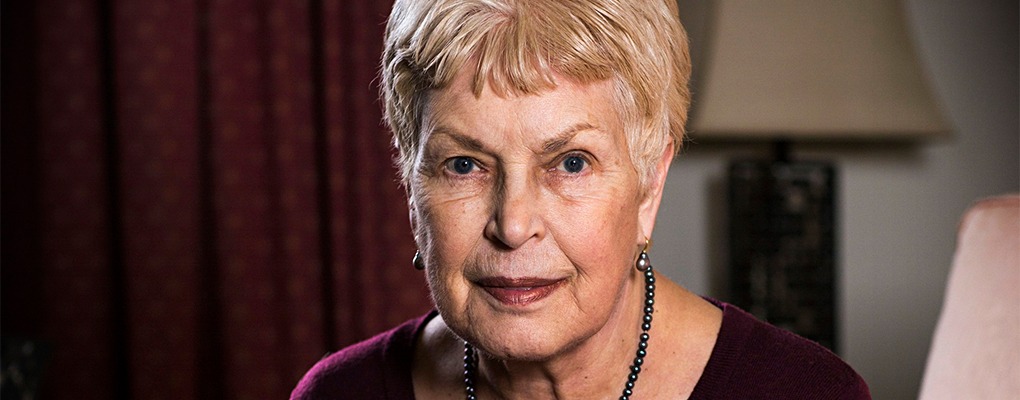Books
Ruth Rendell: an appreciation
There will be many appreciations from people who knew Baroness Rendell personally. I was fortunate enough to meet the great lady, but I was not a friend and I wouldn’t even class myself as an acquaintance. What I was and always will be is an admirer of her work.
At the age of twelve I discovered crime fiction. That was my first ‘Eureka’ moment. I swiftly made my way through all the Golden era classics and two years later was on the lookout for something contemporary. This being Chingford in 1985, I had a limited selection of books in Woolworth’s or the small local library.
 I had never heard of Ruth Rendell when I picked up a paperback of To Fear a Painted Devil. At home, I sat down with Rendell’s book and was instantly transfixed. I could not put that book down until I finished it. I had another ‘Eureka moment’, or maybe this time it was more a ‘revelation’, but I knew I had read something I had never encountered before. I felt a connection with this particular author.
I had never heard of Ruth Rendell when I picked up a paperback of To Fear a Painted Devil. At home, I sat down with Rendell’s book and was instantly transfixed. I could not put that book down until I finished it. I had another ‘Eureka moment’, or maybe this time it was more a ‘revelation’, but I knew I had read something I had never encountered before. I felt a connection with this particular author.
Rendell’s book wasn’t a new title – it had been published twenty years before in 1965 – but it was new to me. To my growing inquisitive teenage brain (just turned fourteen) Rendell’s story did not involve privileged people in a country manor house being dispatched over the Lobster bisque (far removed from my sphere of life). Instead, Rendell’s book involved people who could be living right next door and this struck a chord with me.
Neither the library nor Woolworth’s stocked any other Rendell’s. A few months later I found Rendell’s latest paperback, The Killing Doll (being still at school purchasing hardback editions was not an option) on a turnstile outside a tourist shop in Devon, the pages already tanning as it and the rest of its mates stood out in the glare of the hot sun. I read the first line:
‘The winter before he was sixteen, Pup sold his soul to the devil.’
How could anyone not want to read the rest with such a first line? I bought it there and then.
 Rendell delivered a double whammy where I was concerned. If I thought my first Rendell encounter was a revelation, then The Killing Doll showed me how Rendell had progressed in leaps and bounds since her second novel.
Rendell delivered a double whammy where I was concerned. If I thought my first Rendell encounter was a revelation, then The Killing Doll showed me how Rendell had progressed in leaps and bounds since her second novel.
Here was a writer who wanted to show me the dark corridors of people’s minds, those suffering from delusions and obsessions that were totally destructive. This was unchartered territory for me, an unrecognisable country – and I loved it. I devoured The Killing Doll quickly (I was most probably very boring to the rest of my family for the remainder of that holiday). In time it became a running joke in the family that I would be very quiet for the next few days whenever I bought a Ruth Rendell.
In my quest to seek out more Rendell titles, Mum would take me to Ilford, Essex where there was a large WH Smith. It was here I purchased over the latter 80’s Talking to Strange Men, Live Flesh and The New Girlfriend, and I can still recall my excitement when I discovered A Dark-Adapted Eye by Rendell’s new alter ego, Barbara Vine.
Vine was Rendell shifting up another gear and my admiration for her work skyrocketed. Even now, I feel her work as Vine is sublime and her power of the written word shines through in A Fatal Inversion.
 To me, Ruth Rendell was at her creative zenith in the 80’s during turbulent times: Thatcher and Reagan were in power, paranoia rampaged about an AIDS epidemic, holes appearing in the ozone layer, questions over the validity of the Turin Shroud. We watched in horror at the massacre in Tiananmen Square and the last year of the 80’s saw the end of the Cold War leading to the fall of the Berlin Wall. Politically, it was very heavy stuff.
To me, Ruth Rendell was at her creative zenith in the 80’s during turbulent times: Thatcher and Reagan were in power, paranoia rampaged about an AIDS epidemic, holes appearing in the ozone layer, questions over the validity of the Turin Shroud. We watched in horror at the massacre in Tiananmen Square and the last year of the 80’s saw the end of the Cold War leading to the fall of the Berlin Wall. Politically, it was very heavy stuff.
As an emerging adult, Rendell became an integral part of my 80’s. This woman who was in her fifties at the time was to play such an informative part of my reading life between the ages of fourteen to nineteen and beyond.
I have only ever written one fan letter – and that was to Rendell after reading Asta’s Book which moved me enough to put pen to paper. No other author, singer or actor has ever provoked me to sit down and put my admiration down on paper.
Having started with her psychological novels, these are the ones I prefer. For me, I never know where Rendell will take me, who I will meet and what they will do. Why did Rendell’s novels make such an impression on me? Was it her psychological precision? Was it the cast of social misfits that appealed? Was it the dry, ironic humour that flecked her suspenseful prose? The unexpectedness of her plots which always compelled me to read until the final page? I cannot explain, but her books simply ‘clicked’ with me, they entranced me like no other novelist and the excitement never dimmed when I held her latest novel in my hand.
I am not sure how I will feel when I hold her next book, Dark Corners in my hand. I will still feel the frisson of excitement, but it will be tinged with a sense of sadness that after the final page, the fallen curtain will mark the end of our ‘relationship’ of thirty years, a relationship with a remarkable writer who made such an impression on a reader as he developed from a teenager to a young man.
 During our interview at her London home in August 2014, I was able to ask her some of the questions I had been burning to ask for many years. I had so many questions I could have had twice the amount of time given me. During our short time, Baroness Rendell was a sheer delight. I feel it was because she could sense from my varied questions that I had read all her books!
During our interview at her London home in August 2014, I was able to ask her some of the questions I had been burning to ask for many years. I had so many questions I could have had twice the amount of time given me. During our short time, Baroness Rendell was a sheer delight. I feel it was because she could sense from my varied questions that I had read all her books!
We were not friends, but Rendell formed such a huge part of my reading for so many years as I read and re-read her books. I am not alone with many feeling the same way with the passing of authors like P.D. James and Terry Pratchett. I am sure there are others who feel the same as I do now that Ruth Rendell is no longer with us. For me, she will always be the best crime writer of all time.
Her amazing catalogue will entertain and inform generations to come. She will always be accredited with changing the face of crime fiction, for pushing so many boundaries, for freeing crime fiction from its constraints and showing how versatile a genre it could be. She showed crime fiction could be more of a literary genre than many could ever have imagined and changed it from a poor relation to something so much richer. She will always remain a giant of the genre, a cornerstone, a turning point in the world of literature. For me, Ruth Rendell will always be the writer who opened the eyes of a fourteen year old teenager to the possibility of so much more. For that I will always be grateful.
To find out more about Ruth Rendell’s incredible writing, click here.


Please note: Moderation is enabled and may delay your comment being posted. There is no need to resubmit your comment. By posting a comment you are agreeing to the website Terms of Use.